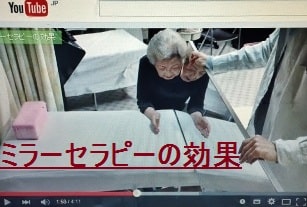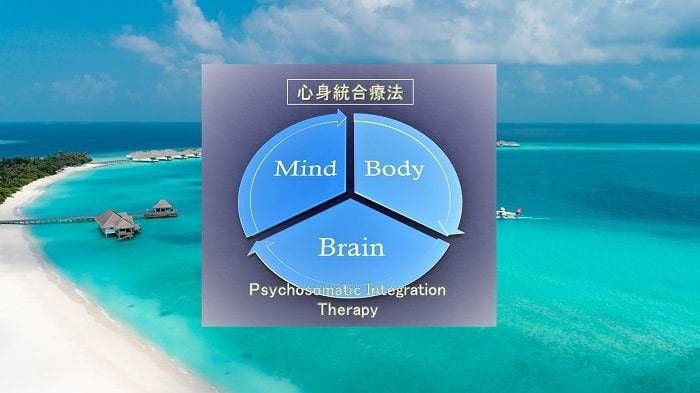
ミラーセラピーとは?
幻肢痛やCRPS(RSD)の治療および脳卒中の回復期リハにおいて利用されている最新療法で、鏡に映った健側の手があたかも患側の手のように見えることで、脳の情報処理システムが改善されてしまうという画期的な手法です。
鏡を利用した医療技術への応用はヴィラヤヌル・S・ラマチャンドランの著作「脳の中の幽霊」で幻肢痛に対する“ミラーボックス”の施術効果が紹介されて以来、脳血管障害における片麻痺の回復期リハにも転用されるようになり、さらに当会代表理事がミラータッチングによる有効性と適応の拡大-
CRPS(RSD)、四十肩、変形性関節症、関節拘縮、腱鞘炎(ばね指)等々 -を報告し、その施術シーンがテレビ番組で紹介されている(➡YouTube)。


鏡のトリック(鏡像認知錯覚)によって映し出される“失った手”が視覚を通して甦ることで、“脳が安心”し、これにより痛みの誤作動が止まると考えられています。
難治性の痛みや拘縮に対する新たな可能性
ミラーセラピーは視覚フィードバックによって神経可塑性を促す療法であり、BReINのタッチ系テクニックは触覚および運動覚フィードバックによって神経可塑性を促す療法です(当会では“神経可塑性”に替わって“脳弾塑性”という用語を使用しています)。
この両者を組み合わせることで、これまで治療の難しかった痛みやしびれ、筋協調性の異常、原因不明の企図振戦(手のふるえ)、難治性の四十肩、変形性関節症、CRPS(RSD)等々に対する治療が極めて安全に、そして効率的に行えることが分かってきました。またギプス固定後の関節拘縮にも応用できることが報告されています。
◆応用例) ①四十肩の施術◆
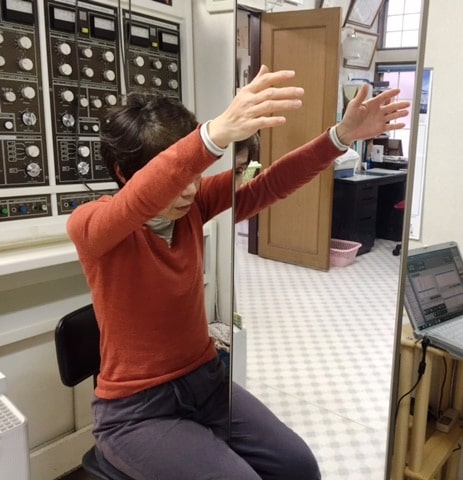
まず最初にBReINを行った上で、写真のようなミラーセラピーを行うと難治性の四十肩がいとも簡単に回復してしまうケースがあり、本人はもとより術者も驚くほどの即効性を有しています。
上の症例は左肩の四十肩です。鏡に映っている右腕を上げ下げしている様子を鏡越しに見ると、まるで左腕(患側)が上がっているような錯覚を覚えます。その上で右腕に合わせて実際に左腕も上げていくと、左腕がスーッと軽く上がります。
効果には個人差がありますが、従来の物理療法や可動域訓練に痛みや脱力を伴うという方には是非試していただきたい手法です。
四十肩の難治症例の中には、傾聴カウンセリングが著効を示すケースがある。当会が推奨するBReINは20種以上に及ぶフィジカル系とメンタル系の施術の融合すなわち認知科学統合アプローチ(COSIA)で、鏡を使ったテクニックはその中の一つとしてカテゴライズされる。
◆応用例) ②変形性股関節症の施術◆
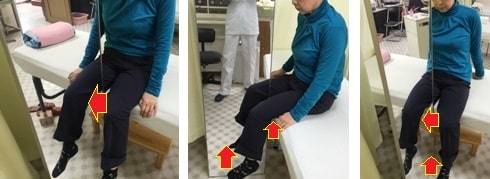
上の症例は右大腿内側広筋の萎縮が顕著な方です。
CRPS(RSD)体質が強い-痛みの感受性能が亢進している-ため、通常の筋トレは痛みのために行うことができません。しかし上の写真のようにミラーセラピーを利用すると、痛みを誘発することなく効率的な筋トレを行うことができます。
自分でゆっくりと膝を伸ばしたり、大腿を内旋させたりする自動運動を鏡越しに見ることで脳弾塑性が発現し、筋出力がUPします。
◆応用例) ③骨盤の歪み&股関節拘縮の施術◆

上の症例は整体師から骨盤のゆがみを指摘されている方です。「あぐらをかくことができない」という訴えで来院されました。たしかに骨盤のねじれがあり、同時に右股関節の拘縮(左写真のように完全に開かない状態)が認められましたが、BReINによって可動域が大幅に回復し、さらにミラーセラピーを行ったところ、写真のように完全に開くことができるようになりました。
このように
◆応用例) ④PMR(リウマチ性多発筋痛症 ◆
PMRは肩、腰部、大腿など四肢近位部の痛みやこわばりを生じる原因不明の炎症性疾患で、全身症状として発熱、全身倦怠感、食欲低下、抑うつ状態、体重減少が見られます。
痛みの原因診断としては脳恒常性機能不全(BD)に伴うソフトペインであることがミラーセラピーによって示唆されています。その実際の施術シーンをYouTubeで公開しています。
ミラータッチングとは?
ミラーセラピーでは患者さんが鏡に映った自身の手足を動かすことによって脳弾塑性を促すのに対し、ミラータッチングはそこに触覚刺激を同期させるテクニックです。
通常のミラーセラピーは視覚と運動学のクロスモダリティ(異なる感覚の同時入力が脳情報処理に影響を及ぼす現象)である一方、ミラータッチングは視覚&触覚、あるいは視覚&触覚&運動覚のクロスモダリティとなります。
ミラータッチングは触覚刺激を併用することで従来のミラーセラピーにはなかった効果を現します。ここではその実際の症例の一部を紹介します。
◆症例1)CRPS(RSD)回復期リハにおける筋力UP◆
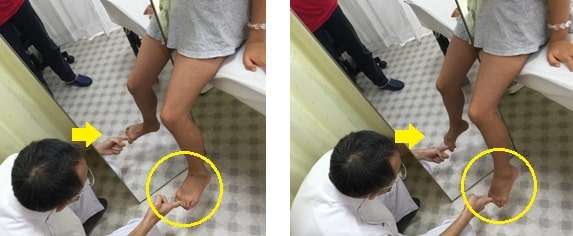
上の症例は右足部に発症した小児CRPS(RSD)です。
あまりの激痛に「この足を切り落としたい」と訴えていた重症例でしたが、BReIN によって痛みが改善し、通常の日常生活が送れるようになりました。
上の写真は回復期において、右足趾の筋力低下に対するミラータッチングを利用した筋力増強運動の様子です。術者の指を掴む練習において、健側の力強い動きを鏡越しに見ることで、“視覚・触覚・運動覚の複合フィードバック”による患側の筋力上昇が起こります。通常の筋トレより遥かに即効性があり、かつ効果的に筋力を上げることができます。
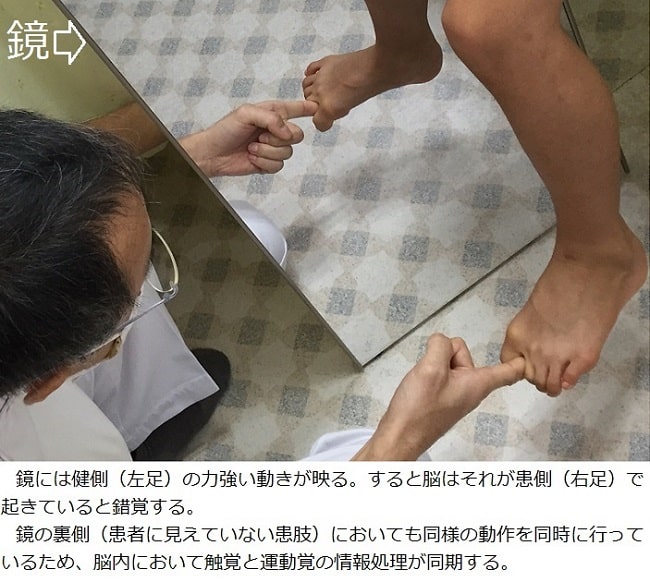
◆症例2) 手根管症候群の施術◆
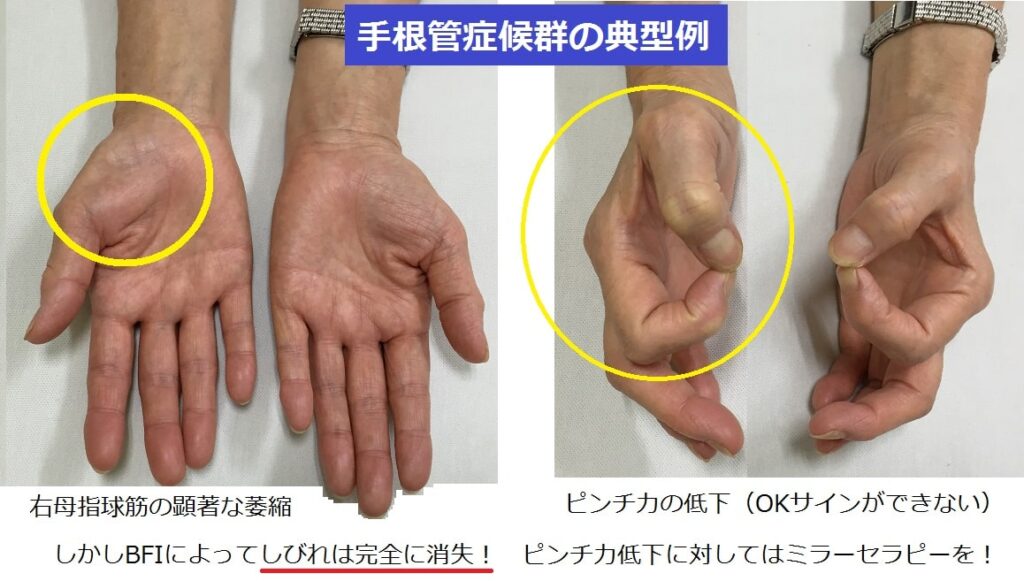
上の症例(67歳・女性)は典型的な手根管症候群です。
ミラーセラピーを行う前段階として、母指・示指・中指のしびれに関してはBReINを半年ほど続けた結果消失。こうした治療的診断の積み重ねによって「しびれの多くは神経脱落症状ではなく、脳の誤作動による感覚異常(paresthesia及びこれに類する知覚異常)に過ぎない」ことが分かっています。
そして下の写真のようにミラータッチングによってピンチ力も回復するという驚くべき結果が得られます。
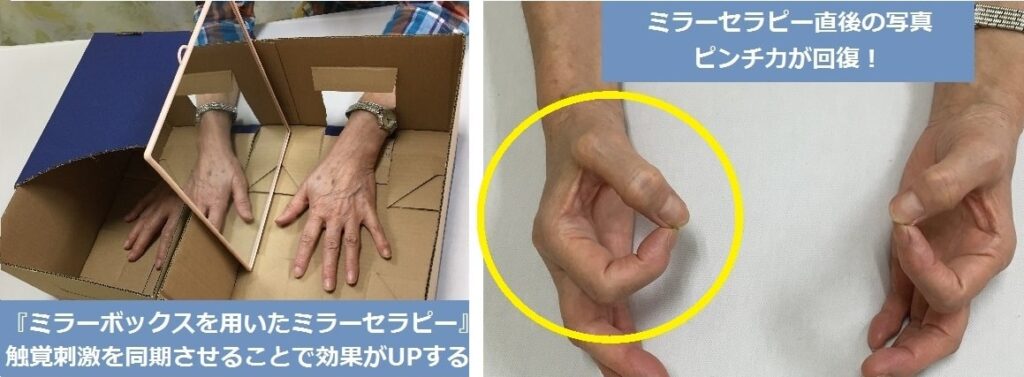
◆症例3) 小児の母指CRPS(RSD)の施術◆
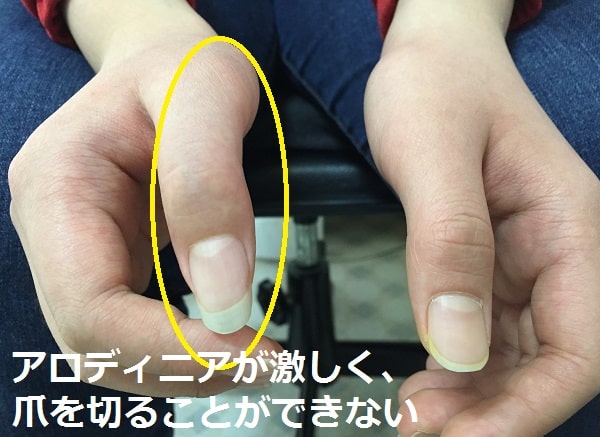
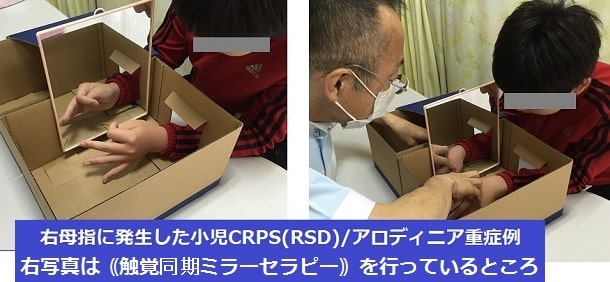
上の症例は母指の激痛のため半年以上学校に行けない状態でしたが、ミラータッチングを含むBReINによってアロディニアが改善し、爪も切ることができるようになり、2か月後には元気に登校できるまで恢復しました。
◆症例4) ばね指(弾撥指)の ◆
ばね指における弾発現象(スナッピング)が劇的に回復した映像です。脳の神経回路の再編成を促すと筋協調性の回復が得られ、結果的に“ばね現象”をも改善させると同時に痛みも改善します。
認知科学統合アプローチ(COSIA)に興味のある方へ
画像ラベリングと痛みの原因診断が乖離する現状において、世界疼痛学会(IASP)は痛みの定義を改訂し、「痛みの感情起源説」にシフトしています。
COSIAに興味のある方は是非一度「医療者・セラピスト専用サイト」にお越しください。貴殿のご参画をお待ちしております。
